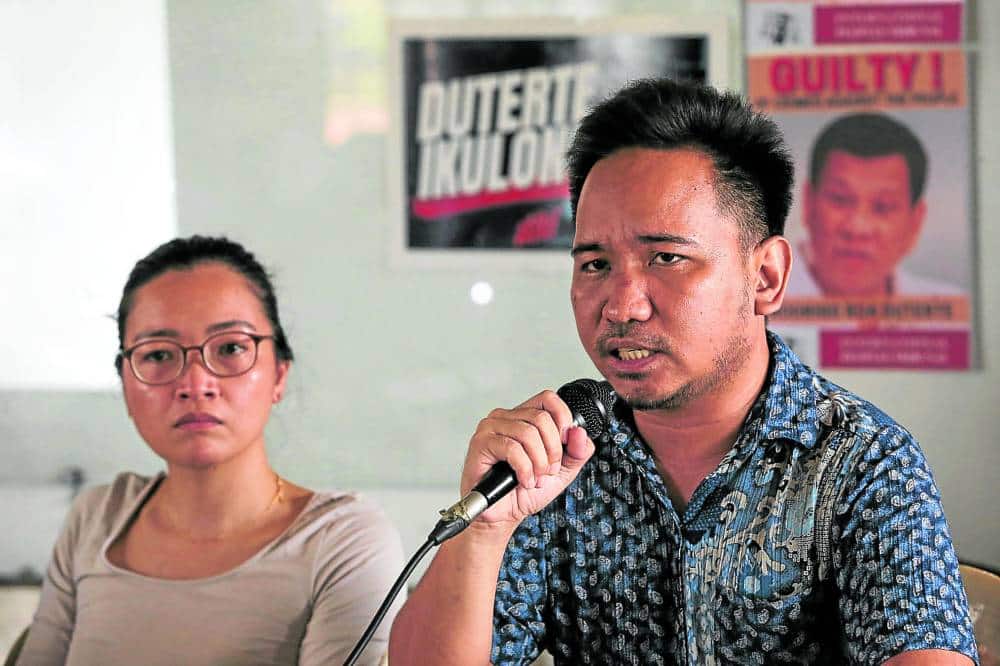
DANGEROUS ADVOCACY Francisco “Eco” Dangla, an antimining activist based in Pangasinan who was abducted then freed three days later by armed men in March this year, holds a press conference next to Karapatan legal counsel Maria Sol Taule in this photo taken on May 10. —LYN RILLON
Environmental activists allegedly abducted by state forces got mixed results in their respective legal battles, with one obtaining a temporary protection order from the Supreme Court and two others failing to secure a permanent order from the Court of Appeals (CA).
In a resolution dated Sept. 9 and made public on Wednesday, the high tribunal granted the temporary protection order (TPO) sought by Pangasinan-based antimining advocate Francisco “Eco” Dangla.
The TPO prohibits military and police officers from approaching his location.
Meanwhile, Jhed Tamano and Jonila Castro, who went missing in September 2023 and later revealed that they had been kidnapped by the military, lost their appeal seeking to reverse the dismissal of their petition for the writs of amparo and habeas data in the Court of Appeals.
In its ruling, the Supreme Court found cause to grant Dangla’s Aug. 30 petition for a TPO, along with the writs of amparo and habeas data.
The writ of amparo protects individuals whose rights to life, liberty and security are threatened by unlawful acts of state authorities or private entities, often in cases of extrajudicial killings and enforced disappearances.
The writ of habeas data safeguards a person’s privacy from violations by those collecting or storing their personal information.
Labeled ‘terrorist’
Dangla has been leading local environmental advocacy efforts and campaigning to protect the Lingayen Gulf from black sand mining. Along with fellow environmental activist Joxelle “Jak” Tiong, he was abducted on March 24 by unidentified men in San Carlos City, Pangasinan, and resurfaced three days later.
Tiong did not join Dangla’s petition.
Before the pair’s abduction, rights group Karapatan said Dangla had been unjustly labeled as a “terrorist” and a “threat” by state security forces. A report from the Regional Peace and Order Council of Region 1 included him in a 2019 presentation as one of the region’s “threats.”
Named respondents include Philippine Army chief Lt. Gen. Roy Galido, Philippine National Police chief Gen. Rommel Francisco Marbil, Brig. Gen. Gulliver Señires (in his capacity as commanding general of the 702nd Brigade), Ilocos Region police chief Police Brig. Gen. Lou Evangelista, and Police Col. Jeff Fanged (in his capacity as Pangasinan police chief).
“[Y]ou, respondents, and all persons and entities acting and operating under your directions, instructions, and orders are prohibited from entering within a radius of one kilometer of the person, places of residence, work, and present locations of the petitioner and his immediate family,” the resolution read in part.
The high court remanded the case to the CA, which was directed to conduct a summary hearing on the petition within five days of receiving the resolution and to decide it after 10 days.
Torture, violence
In a joint statement earlier in March, civil society groups confirmed that Dangla and Tiong were “freed by their abductors,” describing them as “bruised but alive.”
According to Dangla, the abductors did not explicitly identify themselves as military personnel: “They had guns, and the manner of our abduction involved many men, motorcycles, and several vehicles.”
“Since we were blindfolded the entire time, we didn’t know who abducted us, but we were taken to a house or safe house, and there they said, ‘You probably know why you’re here; we hold your lives in our hands,’” he told reporters in May.
Dangla recounted being punched and hit with metallic objects, as well as being subjected to “psychological torture.”
Dangla and Tiong’s case was similar to that of Tamano and Castro, whose petitions for the writs of amparo and habeas data were also granted by the Supreme Court in February.
The high court then directed the CA to decide on their petition for a permanent protection order.
But the appellate court denied their plea on Aug. 2, saying the petition did not prove the state’s involvement in their abduction or the existence of a “continuing threat.”
Tamano and Castro filed a motion of reconsideration, which the CA also denied.